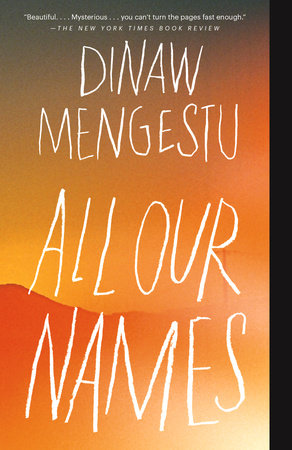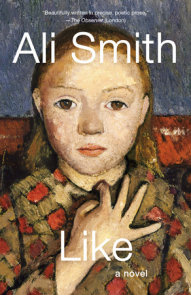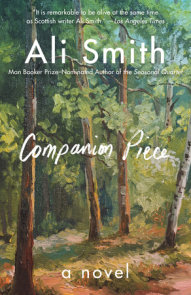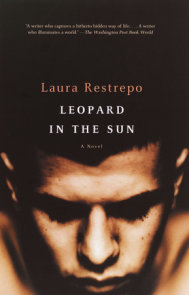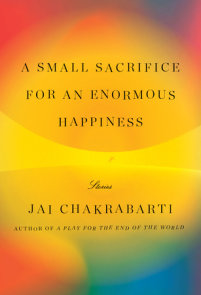READERS GUIDE
The introduction, author biography, discussion questions, and suggested reading that follow are designed to enhance your group’s discussion of All Our Names, the new novel by Dinaw Mengestu.Introduction
A man and a woman each tell the story of their relationships with a mysterious man named Isaac in Dinaw Mengestu’s captivating third novel.Helen, a social worker from the American Midwest, is assigned to watch over Isaac, a young man from Africa with a past kept secret from her. Their relationship quickly turns into romance as she helps him establish his new life. Though a decade has passed since segregation was abolished, the couple must contend with the effects of making their relationship public, and Helen must either confront the possibility of an untenable future and accept the secrets between them or fight for something with Isaac that will last.
In alternating chapters, Isaac recalls his life before meeting Helen. He has left his family and his small village behind to go to the university in the capital, where every student dreams of being a revolutionary and politics is the only subject worthy of study. Unlike the others, Isaac aspires to become a writer, though he is aware of the dangers of this profession. Many of the writers who attended a recent conference in the capital are jailed, missing, or dead. His dreams and the evidence of his poverty brand him as an outcast. As he tries to find his way, he forms a friendship with a charismatic outsider—who ultimately gives Isaac his name and a way out of violence-ridden Africa to a new life in the United States.
All Our Names is about the search for belonging, the things we lose and the things we gain as we find our way, the powerful effects of the past, and the chances we take as part of the journey toward finding our true selves. In intertwining stories of love and exile, All Our Names illuminates the powerful and unexpected varieties of love it is possible to share with another, even when they cannot always be easily named.
Questions and Topics for Discussion
1. Why do you think the author has chosen the title All Our Names for this novel? Why doesn’t the author immediately reveal the name(s) of the narrator of the chapters entitled “Isaac”? When does the narrator take the name Isaac? How many other names has he had? What are some of the names given to him and what is their significance? Why does he give up some of these names?
2. Consider the structure of the novel. Why do you think the author has chosen to alternate between two overlapping storylines and to include two narrators rather than one? What common themes do the alternating narrators help to reveal about the common experiences of the characters? Does this form allow us to make any generalizations about the common human experience? Alternatively, how might the form of the novel help to inform us about the separateness and loneliness of the human experience? What forms does this help to reinforce?
3. How do Isaac and the male narrator first meet? What do they share in common? What draws them together? How does their relationship evolve over the course of the novel? Do they seem to have a traditional relationship? How can their relationship be characterized? At the story’s end, how do they come to characterize their own relationship?
4. On the bus ride to the capital at the start of the story, why does the narrator imagine the capital being nameless?
5. The male narrator notes that there is a difference in the relationship that he and Isaac each has with Uganda. What are these differences and how might they explain the courses of action that the characters take as the story unravels?
6. Why do Isaac and the narrator refer to many of the boys as “Alex”? What meaning does this name have? Likewise, later in the story, who does the male narrator refer to as “Adam”? What does this repetition of names reveal?
7. What is the “paper revolution”? Why does Isaac hang the flyer that describes the crimes against the country? What is the effect of this propaganda? The last time he sees his friend, at the conclusion of the story, what does Isaac add to this list of crimes?
8. Upon meeting Isaac, Helen recognizes that she had several preconceptions about African people. What are some of these preconceptions and how do they change throughout the story? How do the other Midwesterners respond to Isaac? Alternatively, how does Isaac respond to their treatment of him?
9. Why does Helen bring Isaac to the diner she went to as a child? How are they treated there? Does this experience bring them closer or cause a rift between them?
10. Why does it bother Helen that Isaac’s apartment is exceptionally clean? What does it indicate about Isaac and about their relationship? Why does she intentionally make a mess in his absence? Where do we find this scenario changed later in the story and what does it seem to indicate about the evolution of their relationship?
11. Helen observes of Isaac, “Being occasionally called ‘boy’ or ‘nigger,’as he was, didn’t compare to having no one who knew him before he had come here” (page 22). What does she mean by this? Consider and discuss the themes of exile, family, and the effects of history—both personal and cultural—in the book. What other examples of feelings of foreignness are evidenced among the book’s characters? Consider, for instance, David’s description of coming to the city and Helen’s experience of Chicago.
12. Why does Helen say that it is possible that “regardless of what we do, we are tied to all the prejudices in our country and the crimes that come with them” (page 113)? What does she mean? Do you agree?
13. When Isaac was a child and afraid of the dark, hat story did his father tell him? What does Isaac suspect his father hoped it would accomplish? His father tells him the story is true, and Isaac confesses that he believed it in that “way that children have of dismissing reality in the hope of finding something better” (129). Where in the story do we see evidence of others dismissing reality in the hope of finding something better? Do they succeed?
14. Evaluate setting. How does the author’s “visual” portrait of place inform us about the state of the characters? How does the Midwestern landscape compare to the African landscape? What seems to be at the root of these commonalities? Likewise, what differences are evident in the landscapes and, besides obvious geographical factors, what is responsible for these differences?
15. There are many examples of violence in the story. Do we have a sense of who is “right” and who is “wrong” in these instances? What are some of the most surprising examples of violence and what seem to be the causes? What do the people in the book fight for? Is there ultimately any sense of justice or greater good noted in the novel or is the violence portrayed as senseless? What view of war does the author seem to present? What does the narrator’s prayer (page 214) seem to indicate about the nature of war?
16. Isaac says that there is no place in the world he has felt fully at ease. Worse, he says, is dreaming of belonging to a place that will never have you. What does he mean by this? Consider the themes of belonging and exile in the novel. Where do readers find examples of characters struggling to belong or otherwise not being able to belong? If they are unable to belong, what prevents this? Are there any indications of what evokes a sense of belonging?
17. Who gives Helen the idea to go to Chicago? Why does she take Isaac there? How does the experience of being somewhere neither has ever been affect their relationship?
18. Isaac says that rescue “is the true heart behind romance and fairy tale” (page 109). What does he mean by this? Considering the relationships among the characters, does this seem to be true? Can All Our Names be thought of as a fairy tale?
19. When our male narrator indicates that he wants to write about the violence he has witnessed, Isaac tells him to write something nice instead. “No one needs to read this,” he says (page 233). What does the novel suggest about the value of written history? What is the purpose of writing about violence and war? Alternatively, what does the novel seem to suggest about truth in storytelling? Are all the stories told in the novel “true”? How do we know that Helen and Isaac are reliable storytellers?
20. At the conclusion of the story, after saying goodbye to Helen, Isaac reads his friend’s note: “No one will have ever loved each other more than we did” (page 255). How does Mengestu’s story challenge traditional notions of the “love story”? What kinds of love are depicted in the story? What are the challenges or obstacles to these kinds of love and what is the outcome?






